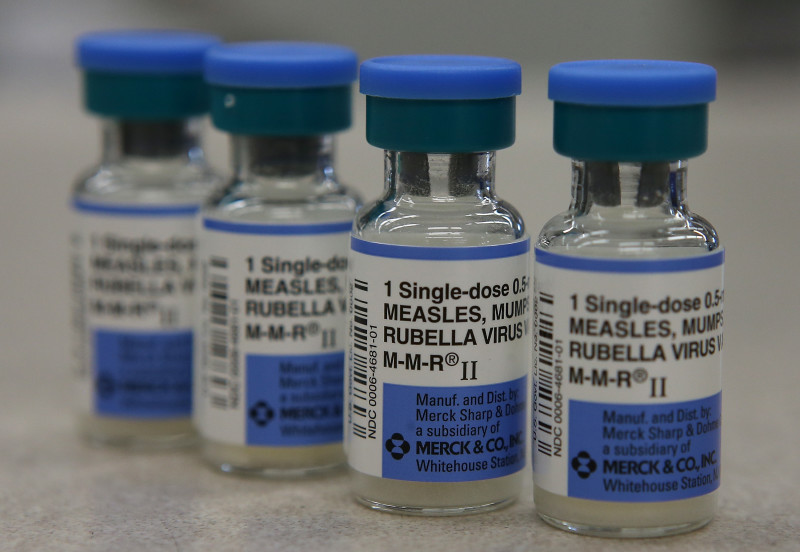(1) Diphtheria
(2) Haemophilus influenzae type b
(3) Measles
(4) Mumps
(5) Pertussis (whooping cough)
(6) Poliomyelitis
(7) Rubella
(8) Tetanus
(9) Hepatitis B
(10) Varicella (chickenpox)
(11) Any other disease deemed appropriate by the state Department of Public Health, taking into consideration the recommendations of the Advisory Committee on Immunization Practices of the United States Department of Health and Human Services, the American Academy of Pediatrics, and the American Academy of Family Physicians.
Ongoing Conflict Over Vaccines
A May poll by the Public Policy Institute of California found that 67 percent of Californians and 65 percent of public school parents think children should not be allowed to attend public school without getting vaccinated. Large majorities also said that childhood vaccines are generally safe.
Ninety percent of parents in California vaccinate their children, but there are pockets in the state where the rate of opting out is high. Marin County, for example, has the highest rate of personal belief exemptions in the Bay Area and among the highest in the state. Last school year, 6.45 percent of Marin’s kindergartners went unvaccinated by invoking the exemption.
Those who oppose mandatory vaccinations were vocal indeed as SB277 wended its way through the Legislature, holding multiple rallies at the state Capitol, getting ejected from committee hearings, and even issuing threats to the bill's backers. The legislation thus became a battleground in the ongoing conflict between those who urge everyone to get vaccinated — a group that includes the scientific and medical community — and those who think the decision should remain personal. Many in that category believe vaccines are responsible for the rising autism rate, a proposition that has never been proved in any way, shape or form but remains an article of faith among some in the anti-vaccine movement.
State Sen. Richard Pan (D-Sacramento), a physician, and Sen. Ben Allen (Santa Monica) introduced SB277 amid the measles outbreak that started in Disneyland last December and spread to at least half a dozen additional states. A total of 117 cases were associated with the outbreak, which was declared over on April 17 of this year.
Here is Gov. Brown's full SB277 signing statement today.
To the Members of the California State Senate:
SB 277 has occasioned widespread interest and controversy -- with both proponents and opponents expressing their positions with eloquence and sincerity. After carefully reviewing the materials and arguments that have been presented, I have decided to sign this bill.
The science is clear that vaccines dramatically protect children against a number of infectious and dangerous diseases. While it's true that no medical intervention is without risk, the evidence shows that immunization powerfully benefits and protects the community.
The Legislature, after considerable debate, specifically amended SB 277, to exempt a child from immunizations whenver the child's physician concludes that there are "circumstances, including but not limited to, family medical history, for which the physician does not recommend immunization..."
Thus, SB 277, while requiring that school children be vaccinated, explicitly provides an exception when a physician believes that circumstances -- in the judgement and sound discretion of the physician -- so warrant.
Original post
The state Senate this afternoon passed amendments to SB277, the bill that ends the vaccine personal belief exemption for schoolchildren. The vote was 23-14 on amendments added by the Assembly. The bill now moves to the desk of Gov. Jerry Brown.
The amendments included a provision to allow consideration of family history by physicians when they grant medical exemptions, and one to honor existing personal belief exemptions until children either reach kindergarten or seventh grade, whichever comes first.
Brown has not taken a position on the bill, but as noted on KQED’s California Politics Podcast, some Capitol observers think the fact that his cabinet secretary, Dana Williamson, testified in support of SB277 at the Assembly’s Health Committee hearing was an indication he supported it, even though Williamson emphasized she was speaking on her own behalf.
In addition, the governor's staff has sent out statements that Brown “believes that vaccinations are profoundly important and a major public health benefit, and any bill that reaches his desk will be closely considered.”
But here's what the San Jose Mercury News wrote on Thursday:
Many pundits are reluctant to predict what Brown will do.
"The three great mysteries in life are the Holy Trinity, transubstantiation and Jerry Brown's mind,'' said Jack Pitney, a Claremont McKenna College political science professor who has studied Brown's decades-long political career.
The last time he endorsed a vaccine bill in 2012, the former Jesuit seminarian tweaked it to make it easier for Californians to claim religious exemptions. Will he be tempted to do that again -- and water down the current legislation?
That 2012 bill was AB2109, which requires parents who want an exemption for their children to submit a signed statement from a health care practitioner who has provided "information regarding the benefits and risks of the immunization and the health risks of specified communicable diseases."
Brown, however, directed the California Department of Public Health to allow for a religious exemption to the requirement.
UC Hastings law professor Dorit Rubinstein Reiss told the Mercury News that Brown "doesn't have the authority to make this sort of change on his own. ... If someone had taken him to court, that clause could have been ruled unconstitutional."
Barbara O'Connor, director emeritus of the Institute for the Study of Politics and Media at Sacramento State, said to the Merc that a religious exemption would prompt the legislative analyst to "say that's not a minor modification -- it changes the totality of the law."
